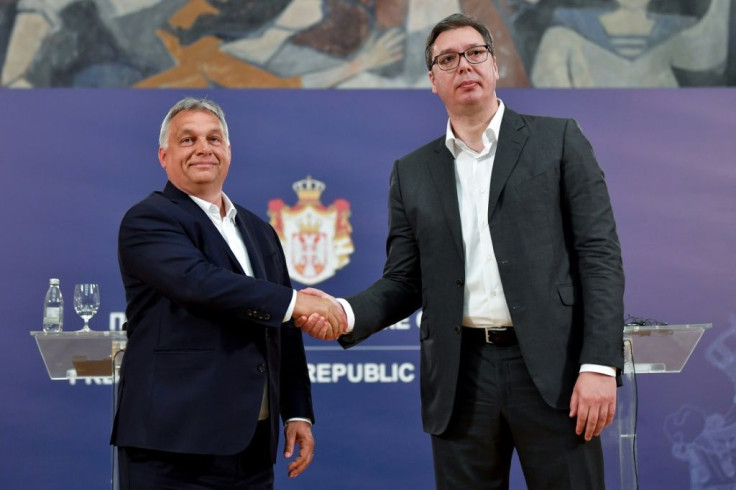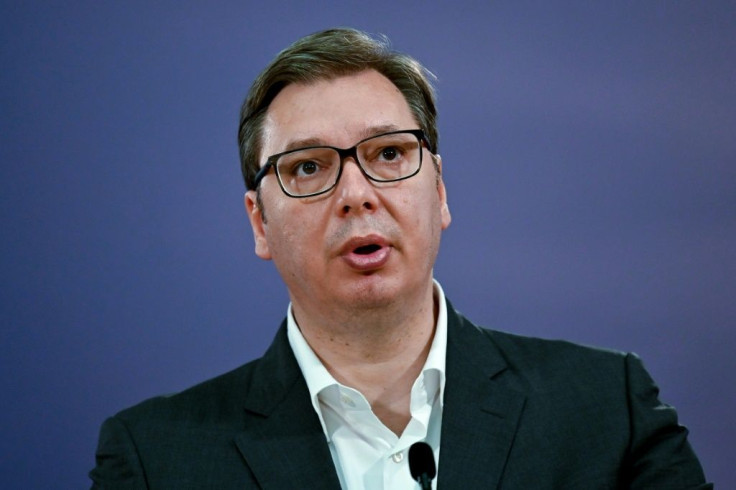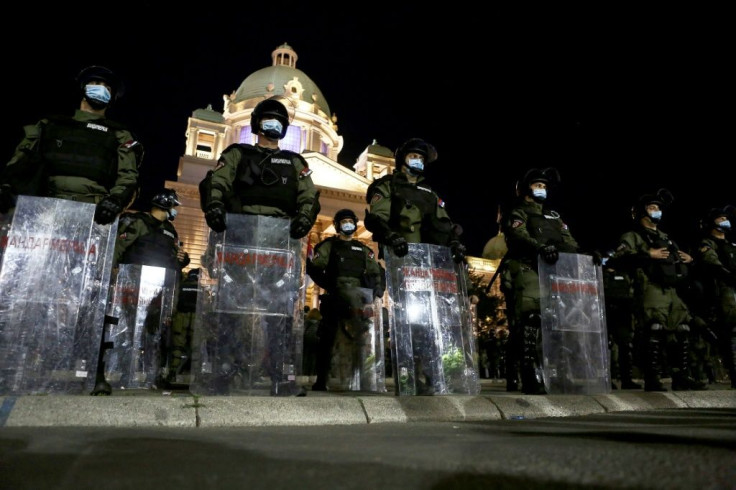Ahead Of Vote, Virus Emboldens Serbian President's One-man Show
An excuse to dominate the airwaves, sideline the opposition and cast himself as a saviour: President Aleksandar Vucic has emerged from the coronavirus crisis stronger than ever as he looks to extend his vice-like grip on Serbia's troubled democracy.
After flattening the infection curve and capping deaths at around 250, the Balkan state of seven million is now rapidly emerging from lockdown in time for general elections on June 21.
In political terms, the relatively low toll has paid off handsomely for a man at the apex of Serbian politics.
Vucic's popularity enjoyed a remarkable rise as infections fell following their peak in March.
Under quarantine, critics took to their balconies to bang pots in protest at the government, but the movement fizzled out after the lockdown was lifted.

In April, nearly half the public said they put their trust in him alone -- a record since Ipsos started polling in Serbia more than 20 years ago.
With the opposition splintered, and some planning to boycott the ballot, Vucic's Serbian Progressive party (SNS) was already well positioned to extend its eight-year rule.
Analysts say the pandemic has further strengthened their advantage, offering the 50-year-old party leader a platform to dole out payouts, claim credit for health victories and stifle protests.
"All the focus was on him, he was the only one showing up in media," Dusan Spasojevic, a political science professor at Belgrade University, said of Vucic, a two-time prime minister before becoming president in 2017.
Already known for tireless press appearances, Vucic and his allies became even more omnipresent as the coronavirus took hold.
In March, ruling party representatives occupied 99 percent of prime-time coverage on five national television channels, according to the local watchdog CRTA.

"If we thought Vucic was already in the media too much, the coronavirus epidemic showed us it could be even worse," said Dragoslav Drencic, a 45-year-old taxi driver in Belgrade.
"We should dedicate a whole channel to him," he joked, a "reality show that could be called 'Permanently with the President'".
At the start of the crisis, cameras rolled as Vucic personally received shipments of medical aid at the airport.
With the country under lockdown, he was "essentially campaigning" by hand-delivering "ventilators to different parts of the country", said Balkans expert Florian Bieber.

"He was omnipresent the whole time while at the same time alternatives were completely invisible."
The health crisis also tightened Vucic's monopoly on decision-making, even though the office of president carries few constitutional powers.
Serbia's already weak parliament barely met during the state of emergency, convening only to rubber-stamp decisions made by the executive.
It "completely exposed the state of democracy in Serbia, demonstrating how the power is centralised in the hands of a few," said political researcher Tara Tepavac.
A former ultra-nationalist, Vucic launched into politics in the 1990s alongside Serbian strongman Slobodan Milosevic, serving as information minister.
In 2008 he pivoted towards the West, winning crucial European Union backing and sweeping his SNS party into government.
Since then he has deftly brought the media to heel using the same "illiberal toolbox" employed by Hungary's Viktor Orban, according to the US-based Freedom House.
Instead of outright censorship, it involves privileged state funding and advertising revenue to friendly outlets, plus selective tax pressure on critical ones.
That has left a media landscape in which some tabloids and channels "serve as SNS propaganda outlets" while less extreme ones "offer more subtle pro-government coverage coupled with extremely limited space for opposition activities," Freedom House says.
Last month the watchdog concluded that Serbia was no longer a genuine democracy but a "hybrid regime" due to "years of increasing state capture, abuse of power, and strongman tactics".
Vucic, whose party did not respond to AFP requests to comment, told local media he found the assessment "full of incorrect information", while conceding "there are some true things in it which we have to work on and fix".
Yet he doesn't have to worry much about competition in the voting booth.
The opposition is divided and some parties are boycotting the vote. They hold around a third of parliamentary seats but the raft of small parties struggle to agree a common cause other than opposing Vucic.
Vucic has condemned the boycott but appears unconcerned, despite lingering virus fears.
"Whoever wants to go out, let him go out," he told reporters. "Whoever won't, doesn't have to. I don't care at all."
© Copyright AFP 2024. All rights reserved.





















